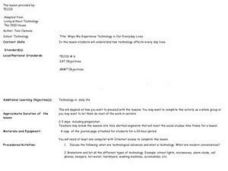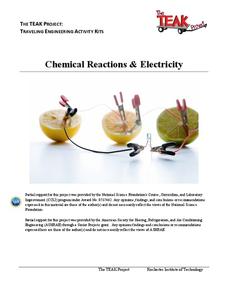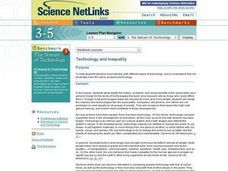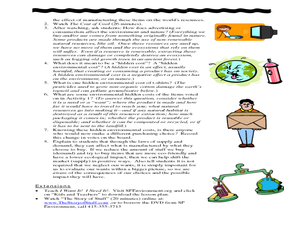Curated OER
The Physics of Cell Phones
Students explain how cell phones work. In this physics lesson, students describe the advantages and advantages of having one. They identify the different parts of a cell phone.
Curated OER
Mobile Phones
Investigate how mobile phones impact their lives through this technology lesson that has students discuss the history of the cell phone and research how cell phones are being used in third world countries. Students create a blog for new...
Curated OER
What Can I Afford?
Middle schoolers explore the costs of various cell phone plans, and various types of banking accounts to determine which one would yield the highest returns if the money saved from the cell phones were placed in different accounts.
Curated OER
Risks and Benefits
Students research and discuss the risks and benefits of cell phones and driving. They analyze the mechanical and administrative causes of the accident of the Space Shuttle Challenger. They write an essay explaining the risks and benefits...
Curated OER
Fuel Cells
Middle schoolers examine how fuel cells and combustion engines work. Using the internet, they research the positives and negatives of the various energy sources. In groups, they complete an experiment with a working fuel cell model and...
Curated OER
Prejudice and Body Image
Learners investigate our society's pressures to conform to standards of beauty - particularly to be thin - and the related prejudice against being "overweight."
Clean Up Australia
Why are Batteries Harmful to the Environment?
Open this lesson by reading together about primary and secondary batteries (such as nickel-cadmium cells), problems they can cause in the environment, and how humans can minimize the damage. Afterward, little ones examine a collection of...
Curated OER
Ways We Experience Technology in Our Everyday Lives
Third graders experience and analyze how technology is utilized in everyday lives. They explore all the technological advances that have taken place over the past twenty years and how those changes have modernized society and offered a...
Rochester Institute of Technology
Chemical Reactions and Electricity
After a discussion of chemical reactions and electricity, scholars break into groups and follow a scripted activity to discover if fruit can power a clock. After a concluding discussion, the class a presented with a challenge.
Middle Tennessee State University
The Invention of the Telephone
All of the people in your class would agree that life would be different without the invention of the telephone! Study Alexander Graham Bell's most famous and influential invention through the primary source document of his...
Prairie Public Broadcasting
Egyptian Pyramids Virtual Field Trip!
A virtual field trip takes enthusiastic travelers to the pyramids of Giza. Using Google, scholars explore the grounds of the ancient pyramids found in Egypt then complete three worksheets: a photo analysis page, a reflection sheet, and a...
Curated OER
Inventions- The Impact
Students investigate inventions and the impact they can have on people. In this technology instructional activity, students research Thomas Edison and discuss how the invention of the light bulb impacted others. Students sketch out an...
Curated OER
RISKS AND BENEFITS
Students explore how to assess and weigh the risks and benefits associated with innovations in science and technology.
Curated OER
R U Talkin 2 Me?
Learners discuss how they use communication devices. They read an article about communication technology. They create a poster depicting the impact of such devices on future generations. They also write a paper about what they have...
Curated OER
Technology and Inequality
Students study briefly the history, evolution, and social benefits of the automobile. After using the automobile as a case study, students choose another technology, research, and analyze it in small groups and report.
Curated OER
The Introduction and Diffusion of Household Technology
Students conduct research and develop a matrix demonstrating the introduction and spread of common household items from 1900 to 2000 in the U.S. They conduct Internet research, watch and discuss a video, and develop the matrix.
Curated OER
Product Design and Production in the Global Economy
Eleventh graders explore the design, manufacture and consumption of personal audio devices and cellular products. They examine the related issues, choices, and consequences in the global economy for such purchases. They research...
Curated OER
The True "Cost of Cool!"
Eighth graders study hidden environmental costs in things we buy. In this consumerism lesson students watch a video about consumerism and analyze advertisements in teen magazines.
Curated OER
Rise of the Modern World
Students analyze art and examples of Cubism art. In this art analysis lesson, students analyze how artists use symbols and complete image based discussion. Students make a list of technological innovations and design a symbol for each...
Curated OER
Power Blackout Assessment
Students discuss the importance of power grids in power generation. In this physics lesson, students explain the impact of power failure. They investigate the power blackout in 2003 and discuss their findings.
Curated OER
Risks and Benefits
Students research "risk." They complete a guided worksheet to help them find relevant answers. They complete an analysis of the Space Shuttle Challenger. Students determine pros and cons of technology





